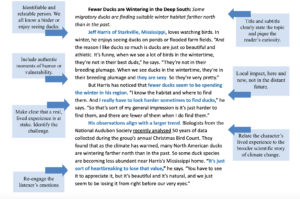Blog · January 23, 2024
What Makes Yale Climate Connections Stories Work?
By Cora Hagens, Natasha Feshbach, Mallika Talwar and Joshua Low
Key Takeaways for Impactful Climate Storytelling
-
- Tell personal stories that connect with people through shared values and emotions.
- Connect the dots for your listeners. Relate lived experiences to the reality of climate change.
- Feature voices from diverse communities.
- Share stories of hope that emphasize the fact that every listener can make a difference.
In December 2022, Wired published an essay entitled “Storytelling Will Save the Earth.” The article emphasized the need to connect emotionally and harness the “power of motivation, imagination, and personal values, which drive the most powerful and permanent forms of social change.” Storytelling is the perfect tool for this, as it helps us make sense of the world around us, bringing more salience and emotion to the climate crisis than abstract statistics. While the power of storytelling may not be surprising, it might be hard to imagine how to produce effective climate stories. Yale Climate Connections (YCC), Yale’s climate news service, models effective climate communication through its radio program, podcast, website, and YouTube channel. YCC’s stories feature diverse people and organizations describing the impacts of climate change on the people, places, and things they care about, right here, right now. YCC stories also profile diverse people and organizations describing how they are taking action to reduce carbon emissions or prepare for climate impact – role modeling active citizenship for a national audience.
Editor-in-Chief Sara Peach and her team use the Yale Program on Climate Change Communication’s (YPCCC) Six Americas segmentation to produce stories designed to resonate with specific audiences. Because YCC’s web content tends to be sought out by Alarmed or Concerned audiences, web articles are more in-depth and focus on solutions and resources. The 90-second radio show, hosted by Dr. Anthony Leiserowitz, director of YPCCC, broadcasts a new story each weekday on over 700 English- and Spanish-language radio stations (Interactive Map) nationwide. The radio audience includes members from all of Global Warming’s Six Americas, so the stories feature diverse voices from every part of the country!
So, what can climate communicators learn from YCC’s experience? Let’s take a closer look at a recent YCC story that exemplifies some of the structural patterns that make these stories so effective.
YCC Story: Fewer Ducks are Wintering in the Deep South
Mississippi birder Jeff Harris has noticed fewer ducks visiting his home state over the past three winters. Research supports Harris’ observation and has found that as winters warm, many species of migratory duck populations in the Southern and coastal U.S. are decreasing while the populations are increasing further north and at higher elevations. Let’s take a closer look at some of the specific elements that make this story work:
Now that we’ve broken it down, let’s look at some broader takeaways from this story:
Featuring Personal Stories
YCC features diverse voices telling personal stories about the impacts of climate change on their communities, and sharing their efforts to reduce global warming. Research has shown that personal stories are particularly powerful because they bridge the psychological distance of climate impacts. To many people, climate change seems distant in time and space with scattered effects, which undermines a sense of urgency. Personal stories, especially when told by individuals themselves, help us recognize the immediacy of the climate crisis and its impacts, and increase our empathetic response to such events. Some other recent YCC episodes have featured a pastor from North Carolina preparing his congregation for climate change, a veterinarian advocating for greater heat protection for racehorses, a new video game called “Highwater” that immerses players in a world ravaged by climate change, and a school in New Mexico helping its students recover from wildfire trauma.
In the story “Fewer Ducks are Wintering in the Deep South,” YCC relates the personal story of Jeff Harris, a man from Mississippi who enjoys birding and has observed the dwindling duck population. His testimony about his love for observing ducks and his dismay at their gradual disappearance makes this story tangible for the listener. We can tell that the dwindling duck numbers are already having an impact on Jeff Harris’ life, and presumably on the lives of many other people in the deep South.
Rooted in Climate Science
While highly personal, YCC’s stories are always evidence-based. Many stories illustrate the scientific consensus that human-caused climate change is happening or report recent research from the enormous field of climate science, impacts, and solutions.
Critically, YPCCC and George Mason’s Center for Climate Change Communication (4C) (GMU 4C)‘s most recent Climate Change in the American Mind survey found that only a third of American adults hear about climate change at least once a week in the news. Many media services report on extreme weather events, but many fail to connect those events to the changing climate. YCC, however, uses a “climate frame” to talk about extreme events, explicitly linking them to climate change, thereby increasing the salience of climate change in the media and the American mind. Further, YCC stories help audiences realize that climate change is about more than just extreme weather –it is connected to almost every aspect of our lives, from public health, food and water, the economy, and national security, to the creative arts, religious and moral values, and much, much more. In “Fewer Ducks are Wintering in the Deep South”, YCC incorporates research that supports Jeff Harris’ observations. By citing this research, the story succeeds in connecting Harris’ personal story to larger climate trends, thereby emphasizing how climate change is affecting the daily lives of everyday Americans.
Harris’ story is only one of thousands broadcast by YCC over the years. Here are some additional elements of effective storytelling that are commonly found in YCC stories:
Featuring Voices from Diverse Communities
Climate Connections’ radio program helps listeners “connect the dots” between climate change and events happening to real, relatable people all across America, which helps to frame climate change as a global, national, and local issue. The most recent Climate Change in the American Mind survey found that while 57% of Americans agreed that global warming was already harming people in the U.S., and nearly 70% believed that it would harm people in developing countries, only 47% of Americans thought that climate change would personally affect them. YCC’s stories communicate that climate change is already having effects all around us, even in nearby communities. While it’s crucial that we care about how climate change is severely impacting communities worldwide, seeing others similar to us being affected by climate change is particularly effective at minimizing the psychological distance of climate change and increasing willingness to take action.
A YPCCC study conducted in 2021 found that YCC radio programs featuring Republicans and conservatives talking about their concerns about climate change or the pro-climate actions they are taking were able to increase conservatives’ perception of how many Republicans are worried about climate change. Seven of the twelve programs tested in the study produced this effect, demonstrating that it was effective in shifting their perception of Republican social norms about climate change. While podcast listeners and website visitors are more likely to be Alarmed and Concerned voters, YCC’s radio programs reach a more diverse audience, including many conservatives. Featuring voices from all over the country and from all over the political spectrum makes climate change a more accessible and relatable topic to these listeners.
Many YCC radio programs also feature the voices and stories of diverse people across race, ethnicity, age, gender, socio-economic class, region of the country, and profession, helping listeners understand that climate change affects everyone, and especially those who have contributed least to the problem, but are being hit first and worst by the impacts.
Centering Hope and Optimism
Yale Climate Connections’ programs “confront reality and share stories of hope.” While they tell difficult truths about the way that our world is already changing as a result of climate change, they also emphasize hope by profiling community changemakers, promoting innovative solutions, and helping each listener understand their ability to help create change.
One recent episode about Phoenix residents battling urban heat features a local initiative, the Phoenix Revitalization Corporation, which partnered with the Nature Conservancy to create the Urban Heat Leadership Academy. The five-month online program has already been completed by about 100 residents, and teaches participants how to protect their communities from the impacts of urban heat. By employing a problem-solution narrative structure, this story makes people aware of a challenging reality but inspires them that communities are taking action and finding solutions. Stories like this inform, reassure, and inspire listeners, and show them that their actions, no matter how small, can have a positive impact.
Boosting accessibility with succinct stories
YCC has made a strategic choice in the format and length of its media: a national radio program of 90-second stories. Radio reaches all of the Six Americas, whereas climate-related online news is rarely sought out by the Doubtful and Dismissive. Further, the YCC radio audience includes a high concentration of opinion leaders, including business leaders, influential civic and community activists, and early adopters.
Other notable radio programs that talk about climate change are often targeted towards educated, Alarmed listeners, and run in hour-long episodes. Although brief, the 90-second story is well-suited to maintain listener attention while still efficiently communicating the most crucial aspects of each topic. In recent years, the trend toward short-form social media posts has forced other media creators to condense their own content to fit the attention spans and expectations of the modern-day listener. The effect this has on the efficacy of YCC’s programs is a seemingly positive one: their stories must be succinct, but that makes them accessible and engaging for many listeners across the Six Americas.
Learn more about Climate Connections and access their archived episodes on their website: https://yaleclimateconnections.org/

